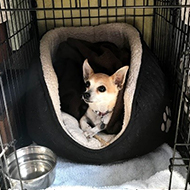
BSAVA and BVBA produce Q&A sheet to support veterinary professionals.
New guidance to help veterinary professionals support pet owners navigate the challenges posed by the easing of lockdown have been published by the BSAVA in collaboration with the BVBA.
The guidance, which comes in the form of a Q&A sheet, comes amid concerns from behaviourists and animal welfare organisations that there may be a rise in behavioural issues as life gets back to normal.
Written for vets to pass on to their clients, the guidance explains some of the key behavioural concerns and how they can be prevented and managed. Topics include separation-related issues, animals becoming anxious as the world around them becomes busier and noisier, and puppies lacking appropriate skills when greeting animals from other households.
“We hope that this information will help vets to support their clients and their pets when faced with potential challenges as we transition out of lockdown,” said Dr Hannah Donovan, vet, clinical animal behaviourist and social media officer at the BVBA.
BSAVA president Professor Ian Ramsey added: “This guidance has been developed in collaboration with the BVBA with the intention of supporting vets in practice in an ever-changing environment. It sits alongside other practical BSAVA resources vets can share with pet owners, such as Vaccination Guidance and Neutering Guidance, and follows the BSAVA’s core ethos – ‘By the profession for the profession.”
The BSAVA has also created a collection of resources for veterinary professionals relating to the prevention, management and treatment of behavioural issues in cats of dogs. These resources are freely available in the BSAVA Library until the end of July.
The collection includes chapters from the BSAVA Manual of Canine and Feline Behavioural Medicine. For those wishing to buy the full manual, there is a £10 discount on both the print and online editions throughout July (using code BEHAV10 on checkout).
Image (C) Hannah Donovan.



 The Animal and Plant Health Agency (APHA) has updated its online reporting service for dead wild birds.
The Animal and Plant Health Agency (APHA) has updated its online reporting service for dead wild birds.